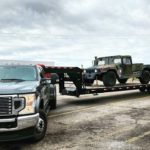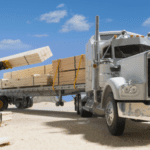
One of the biggest questions every owner-operator must address is whether to use a dispatch service to find loads or rely on self-dispatching. There’s no universal right answer to that question and there are many different factors that can make either choice the right option.
When making your decision, the most important thing to consider is probably cost. Dispatchers typically get paid a percentage of your earnings off of each load they find. Some dispatchers charge a flat rate (for example, $50 per load), but most higher quality dispatch services will charge an average of 5-10 percent for each load. That can add up fast — especially if you’re a smaller operation.
This piece will take a closer look at the pros and cons of using a dispatcher or trying to self-dispatch for owner-operator companies. It will cover:
- What Do Dispatch Services for Owner Operators Do?
- How Do Dispatchers Get Loads?
- Should Owner-Operators Use a Truck Dispatch Service?
- How to Self-Dispatch as an Owner-Operator
- When Does It Make Sense to Self-Dispatch?
- How to Choose the Right Owner-Operator Dispatch Service or Load Board
- Making the Right Choice for Your Business
What Do Dispatch Services for Owner-Operators Do?
The role of a truck dispatch service is essentially to manage freight on behalf of owner-operators or carriers. A dispatcher’s job involves locating loads, connecting with brokers, conducting negotiations, and eventually dispatching drivers and setting up their routes. Sometimes dispatchers will also help with back-office work like reviewing truck drivers’ logs and tracking their hours. The best dispatchers may go even further, helping you maintain motor carrier compliance, manage delays, improve relationships with shippers, and more. In return for these services, dispatchers take a portion of your earnings for each load they find.
It’s important to understand that freight dispatchers are not the same as brokers. A freight broker is a legal entity that serves as a middleman between the manufacturer or shipper (who needs their freight moved) and the carrier (who can move that freight). The freight broker is legally allowed to represent both the carrier and the shipper at the same time, but they should never have a personal investment in either side. The dispatcher, on the other hand, is directly affiliated with a carrier and works on their behalf alone. In fact, dispatchers are not legally allowed to represent manufacturers or shippers.
How Do Dispatchers Get Loads?
The goal of a freight dispatcher is to find high-quality, relevant loads for their clients. Once you have an owner-operator dispatcher contract in place, it’s up to the dispatcher to learn about your operation and which loads best fit your business. Some dispatchers will use their personal connections to find loads. Or, in many cases, they will use load boards to find freight for you. That’s right — just like anyone who self-dispatches, professional dispatchers also use load boards to find the right freight.
In fact, freight dispatchers often use the exact same load boards that an individual owner-operator has access to. Dispatchers use those boards in the same way, either posting their clients’ trucks and letting the system find a match or performing a search. To search, all they have to do is put in the information about the truck they are trying to fill including the type, any special features it may have, and the lanes, origin, and destination they are looking for.
Should Owner-Operators Use a Truck Dispatch Service?
Clearly, there are pros and cons to using a truck dispatch service. The main con is the cost. You’re giving someone else a significant part of your earnings for performing a function that you could hypothetically do on your own.
On the other hand, not having to worry about finding loads yourself can leave you free to spend more time on the road. That means you may end up delivering more loads and thus earning more than you would if you tried to self-dispatch without a quality system in place. Further, the best truck dispatchers typically have good negotiating skills and go into conversations with brokers armed with knowledge about specific lanes and markets. Given that a higher rate will benefit them as well as you, freight dispatchers often end up negotiating better rates for loads than individual owner-operators can get on their own.
At the same time, a common misconception when it comes to dispatch services is that dispatchers are able to find loads that you couldn’t find on your own. In most cases, that’s not true. Since they’re often using the same load boards as everyone else, they have access to the same loads that you could find on your own. The only difference is that they can spend the whole day searching those load boards while an owner-operator also has to spend time on the road.
In addition to saving you time and potentially securing you better rates, good freight dispatchers often offer additional services that can help owner-operators run their business — especially when they’re first starting out. For instance, they can help:
- Make sure you maintain motor carrier compliance
- Manage relationships with shippers and tackle any issues that may arise
- Navigate unexpected delays while you’re on the road
- Handle back-office tasks including paperwork, billing, and collections
In short, if you’re willing to give up some of your earnings on each load you deliver, using a dispatch service can be a good idea. If you’d rather keep your full earnings, self-dispatching is probably a better choice for you.
How to Self-Dispatch as an Owner-Operator
Finding loads as an owner-operator means following the same procedure as a dispatcher, except that, unlike a dispatcher, you’re finding loads for yourself. To accomplish this, you need a load board that makes it easy to post your truck and search for loads. Your load board should also offer thousands of loads posted each business day so there’s always something new to choose from. One load board that meets all these criteria and more is DAT.
When you self-dispatch with a quality load board like DAT, you not only get access to the biggest freight marketplace available anywhere, you also have the power to ensure you never miss the perfect load. Freight dispatchers may try to convince you that the only way to find loads is to spend all day on a load board, but with DAT you can set alerts so that you’re always notified as soon as a load matching your search criteria pops up. That way you can spend more time behind the wheel without worrying about missing loads.
A quality load board will also give you the information you need to navigate broker negotiations. For example, DAT’s load boards provide data on specific lanes and market rates for each load, based on thousands of real transactions that occur on their website. That means you can always go into your negotiations prepared with the knowledge you need to get the highest rates possible.
When Does It Make Sense to Self-Dispatch?
Self-dispatching isn’t for everyone, but many owner-operators find it to be the right choice for their business. To self-dispatch, you should be willing to regularly devote some time to searching for freight. You also need to have the confidence to negotiate with brokers.
If you do choose to self-dispatch, you’ll save money since you don’t have to give a percentage of your earnings to a dispatcher. Self-dispatching also lets you build your own relationships with shippers and manufacturers, which can prove incredibly valuable when it comes to growing your business. Even better, self-dispatching gives you complete control over your business. Given that many owner-operators choose to start their own business because they want to gain control over their work, giving someone else the power to find your loads can seem counterproductive.
How to Choose the Right Owner-Operator Dispatch Service or Load Board
When it comes to choosing the right load board, there’s no better choice than DAT. With DAT, you get access to the largest freight marketplace in the business, backed by quality customer service that will ensure you’re supported as you learn to navigate the load board.
If you’re choosing a dispatcher, things get a bit more complicated. There’s no universally agreed-upon best dispatch service, which means you’re going to have to do some research to find the option that’s right for you.
The first thing you need to do is make a list of what exact services you’re looking for from your freight dispatcher. Are you just looking for help finding loads? Or do you also want help building customer relationships and managing back-office tasks? Knowing what you’re looking for will give you a good place to start your search.
From there, you should start seeking out recommendations from people you trust. Talk to your peers about which dispatch services they use. You should also try to find reviews from real users online. That can help you get a sense of whether a dispatch company really delivers on everything you’re looking for.
Finally — and very importantly — you need to consider cost. How much does the dispatch service charge per load? Can you handle that amount in addition to all the other costs that are necessary to operate your business? Is there a minimum amount you can charge per load to cover all those accumulated costs? You need to have those numbers ready before you start speaking to a dispatch service so you don’t sign a contract that is not in your best interest.
Making the Right Choice for Your Business
In the end, the choice between self-dispatching and using a dispatch service is a personal one for each owner-operator. The important thing to remember is that it’s all about finding the right fit. If you hire a dispatch service, you need to make sure you have a dispatcher whose model will work for you. And if you self-dispatch, make sure you’re using the best load board on the market: DAT.













